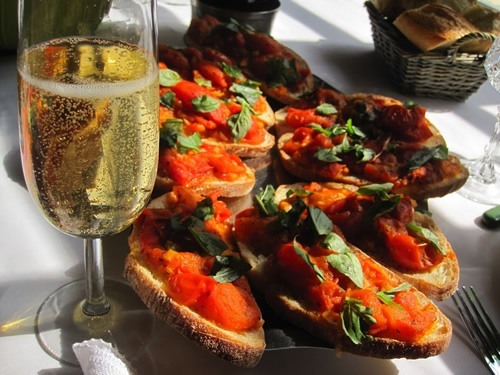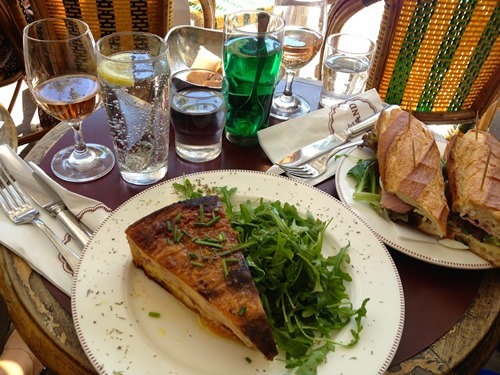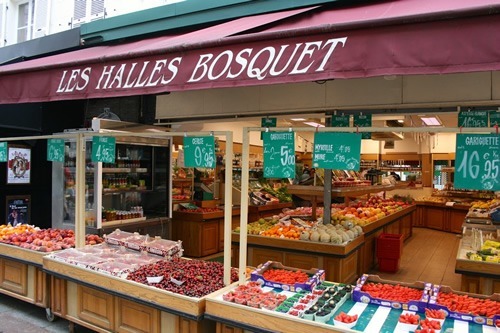Taking Long Lunches in France
Article and photos by
Kate Hunter
 |
| One of many lunch options
in France, where food is enjoyed slowly. |
I was a New Yorker. It was normal
to sit in close quarters with colleagues at work during lunch
hour and discreetly consume a mixed salad that I bought
at the café that was a part of the
lobby within the office building. I thought it was standard to rush to work and
then sit for the first hour reading the news. I thought
all of this was normal until one birthday I arrived at
my desk only to see a piece of cake left for me on my
chair, while my colleagues sat fixated at their computers. I
worked in a tense and awkward environment, with my coworkers
too within their bubbles to lift their eyes for a moment
and even wish me happy birthday. In that moment, I wondered
if I would ever find a place that would pause to celebrate
life.
Transitions
I moved to a historic town
20 kilometers (12 miles) west of Paris, France. At first,
stereotypes about the French were in the forefront of
my mind, I experienced culture shock,
and even moments of tears. Only after living in the country
for some time did I start to see the wide array of cultural
colors shine though.
When I arrived in France, I did not
speak any French. I would spend days dedicated to French
lessons and working at an international school in the
afternoons. In between, I would struggle with the metro
system, walk endlessly, only to make it home to inhale
lunch. I would turn around quickly to bike to the office,
all so that my school-lunch-work commute would take up
less than an hour.
My boyfriend, now my époux (husband), would
laugh and say, “No one is checking, chill out, relax
a few minutes…” Out of personal habit, I thought that
I was being a responsible and diligent person. Anyway,
how could I deserve an extra few minutes when everyone
else must be expecting me back at work?
Learning to Work to Live
The same personal habits and attitude
started to come to my attention when I would collaborate
with my French colleagues, whom I accidentally offended
on a regular basis with butchered and politically incorrect
French phraseology. Only through hearing rumors did I
realize that what I thought was an honorable work
ethic on my part was so intense that they actually thought
I was working to get them fired or steal their jobs.
I felt that my coworkers did not understand that I just
wanted to help and do the most I possibly could. In France,
my behavior could be interpreted as a threat, while in
New York it would have been positively reinforced.
In New York City, you do not go to
bed at night wishing to dream about the kudos your boss
has given you for going above and beyond your job requirements.
You do those things in New York because there is so much
intense competition; there are real threats in the concrete
jungle and you need to stand out and keep watch to ensure
that no lions come into your camp at night. When you
overcome that sense of fear and actually get to know
your colleagues, not just for the reports they produce,
but for the interests you share and support you give
one another, your work environment takes
on another light.
What took me some time to realize
in France is that it is fine to do what’s necessary at
the office, but then go home and live, not just un
petit peu (a
little bit), but beaucoup (a lot). The French
work to live — by earning enough to take their
once-in-a-lifetime vacations each and every year, even
if that means they save every centime by cutting
back. Many will spend 25 days in Tahiti, where they will
snorkel a minimum of 12 times, and may come back with
a tribal tattoo.
Working Hard, Living Slow in
France
In France, when you arrive in the
morning you actually dive right into your day,
work like mad without a second to spare for a glance
at your phone or the news online, and pack up at 5 p.m.,
quite satisfied and with nothing to prove. In the middle
of the workday, you pause for a long lunch. Sometimes
those long lunches are around tiny tables with
colleagues where you order a menthe à l’eau (mint-flavored
water) as an apéritif, followed by three courses
and a café. I am lucky to share offices with
my husband, and that our apartment is a pleasant 4-minute
walk away. We are able to walk back to chez
nous (our place) to make a sandwich and sit in our
garden on a sunny day. In France, we can exhale and have
daily periods where we reconnect with our lives. We do
not remain completely and perpetually connected to our
professional lives. Where our first lunches in France
were eaten in haste, today I have learned to cherish
time slowed down.
 |
| Pausing for a long déjeuner is normale. |
Taking a long déjeuner is
not only totally accepted, but encouraged. A French child
rarely goes to school with a box of processed
foods or a bag of snacks. Children will often actually
return home, on their trotinettes (scooters),
to share a real meal with their family, since meals are
a sacred moment in the day. Perhaps you sit on a park
bench, or go to a local tearoom; even the most basic
moments in daily life are a way to step away and breathe.
Delis exist but are more rare than in New York City,
for example, and should you opt for something preparé,
the boulangerie will
delicately wrap your baguette sandwiche, as
well as a chocolate treat or pâtisserie (pastry),
with a pretty bow. And during
a lazy Sunday afternoon, you can serve poulet rôti (roasted
chicken) with some grainy mustard on pretty china and voila, you
instantly have an elaborate 3-hour picnic luncheon.
At the end of our workday, we meander
around the town center and spend just as much time filling
a small shopping bag as we would a large cart in the
U.S. However, instead of aimlessly perusing aisles full
of unnecessary marketing campaigns or hopping around
for the best prices, we are at a food source, hearing
tales from the fromager about where our cheese was
produced, or the boucher carefully preparing
meat while detailing his favorite recipe. We buy a dozen
oranges to squeeze our own juice, choosing the experience
and taste versus the convenient alternative. We may not
have as great a quantity of merchandise to show for the
shopping trip, but we gain so much more in quality by
slowing our pace and opening our senses.
 |
| Going to the market in France
is a sensory experience not to be missed. |
Making Friends in France
Making friends was particularly difficult
as a foreigner at the start of my French adventure. I
was told early on that Americans were “superficial,”
which is fair enough as some Americans think that French
are “snobby,” but was still a little offended by this
notion. My best attempts at conversation did not get
much response. No one really contributed to the conversation,
nor did my French acquaintances open up much other than
to speak about generic subjects. In my experience in
the U.S., we would have been best friends after sharing
the type of conversations I attempted to initiate. We
may have even shared our entire life stories and finished
with a hug.
Over time, I learned that the French
are very selective about whom they allow as a friend,
and that friendship does not come in as many forms as
in the U.S. In France, you have fewer acquaintances or
friends. You socialize and take the time to develop genuine
and deep friendships, such that when they bloom, they
last a lifetime. Less superficial, perhaps. Once
I started nurturing relationships and investing in them,
by having rendezvous over
tea, for example, more French women actually opened
up and reciprocated. When I have a birthday at work now,
I not only receive many homemade cakes, but bisous (kisses)
throughout the day from people who are genuinely happy
to have something to celebrate. When getting to know
someone in France you generally do not just grab a drink
together at the bar on the way to another bar to meet
another friend, but actually invite them to your
home. You then will often host, invite them to your
dinner table, and converse for hours about previous,
upcoming, and dream vacations over a bottle of Bourgogne wine,
along with homemade moelleux au chocolat. The
friends I have made in this way remain, and it is a testament
to how I prefer to build relationships going forward.
The adventure of such a new life,
where you learn to slow down and
focus on a connection with the people around you, often
helps reorient your compass based upon personal and not
just professional values. Having
experienced such immersion, I have become a global citizen
who sees the world differently, who appreciates long
walks and longer lunches, who tries to connect with people
in a deeper manner, while not just interacting with projected
personas. I hope to have many cups of tea with
new friends, or impromptu glasses of bubbly while shopping
in the grands magasins, pauses in a park with
a box of macrons for no good reason at all…
because savoring every little moment, c’est la vie!
Katie Hunter is
a New Yorker who grew up in a haunted house in the "upstate" countryside
who hopped the pond with her French-American husband
in 2009 to live 20 km (12 miles) west of Paris where
she learned the language from scratch. She has since
traveled to 25+ countries, transforming her into a
true global citizen thanks to the multitude of faces,
colors, sites, smells, sounds, tastes and interactions
that she has lived and cherished. She likes to think
outside of the box and travel in the same spirit,
as many trips have been off the beaten path, connecting
with the local communities in a sustainable way.
|